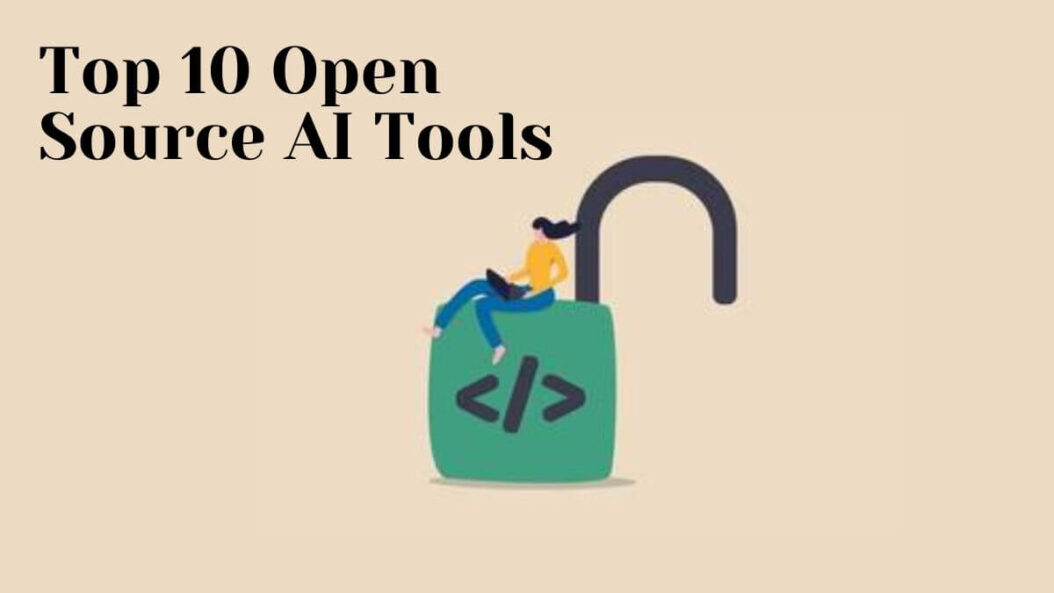The field of artificial intelligence (AI) is advancing at a rapid pace. With so many new tools and frameworks becoming available, it can be difficult to know where to start. The good news is that there are many high-quality open source AI tools out there for anyone to use. In this article, we will highlight 10 open source AI tools covering a range of capabilities from computer vision to natural language processing. For each tool, we will provide an overview of its key features and capabilities. Whether you are a student looking to get hands-on with AI, a researcher wanting to build custom models, or a company needing off-the-shelf AI capabilities, this list has something for you. Let’s get started!

Image Recognition & Computer Vision
Computer vision tools can analyze and understand digital images and videos. This enables applications like facial recognition, gesture recognition, and autonomous vehicles.
OpenCV
OpenCV (Open Source Computer Vision Library) is an open source computer vision library featuring over 2500 optimized algorithms. Some key highlights include:
- Algorithms for facial recognition, gesture recognition, and machine inspection
- Functions for manipulation of video and images
- Cross-platform compatibility
- Active open source community with over 47 thousand people
With bindings in C++, Python, Java and MATLAB, OpenCV is a versatile library suitable for beginners and experts alike.
Natural Language Processing
Natural language processing (NLP) tools can analyze and generate human language. This powers applications like chatbots, text summarization, and sentiment analysis.
spaCy
spaCy is an open source NLP library for advanced natural language understanding in Python. Some key features are:
- Part-of-speech tagging and text categorization
- Word vectors and word embeddings
- Named entity recognition
- Integration with deep learning frameworks like PyTorch and TensorFlow
spaCy is designed specifically for production use cases. Its simple APIs make it easy for newcomers while still meeting enterprise standards.

Speech Recognition & Synthesis
Speech technology enables systems to understand spoken language and generate human-like speech. This allows more natural human-computer interaction through voice.
DeepSpeech
DeepSpeech is an open source speech-to-text engine which can run in real time on devices ranging from a Raspberry Pi 4 to high power GPU servers. Its key features include:
- Implementation of Baidu’s Deep Speech architecture
- Trainable to work with any language
- Streaming transcription for live speech
- Runs fast enough for real-time applications
DeepSpeech represents a full pipeline all the way from audio waveform to text transcription. The active development community keeps improving performance and ease of use.
Reinforcement Learning
Reinforcement learning has powered breakthroughs like AlphaGo Zero and simulated robot training. It allows systems to learn complex tasks by trial-and-error using rewards and penalties.
Coach
Coach is a reinforcement learning framework for training intelligent agents in virtual environments. Its key qualities are:
- Supports popular RL algorithms like DQN, A3C, and PPO
- Easy definition of custom neural networks as models
-Environments encapsulate simulation and visualization - Scales to leverage hardware like GPUs and distributed clusters
The Coach project originated at Intel, and has found widespread use in industrial applications of reinforcement learning.
Computer Vision Model Training
The boom in computer vision has been fueled by the ability to train custom deep neural network models on specialized datasets. The following tools make model building more accessible.
fast.ai
The fast.ai library builds on PyTorch to create an easy-to-use framework for computer vision deep learning. Some highlights:
- Standardized training loop and model fitting functions
- Implements techniques like one-cycle training and mixed precision
- Quick methods to get started with pretrained models
- Can scale to leverage GPUs and distributed training
With an emphasis on rapid iteration, fast.ai is popular among data scientists and beginners alike. The availability of pretrained models allows surprisingly advanced applications even for nonexperts.
MMDetection
MMDetection is an open source toolbox for training object detectors across various domains. Its key aspects include:
- Implementation of models like Faster R-CNN, Mask R-CNN and RetinaNet
- Support for a wide variety of datasets out of the box
- Modular design for easy customization and extension
- State of the art model architectures and training schemes
With a comprehensive model zoo including weights for all supported configurations, MMDetection makes it simple to detect objects ranging from faces to fabrics.
Conclusion
The open source AI landscape contains impressive tools even outside the realm of industry heavyweights. As this article illustrates, full-fledged capabilities for computer vision, NLP, speech, reinforcement learning and more are available under permissive licenses. For those looking to dabble or go deep in AI, leveraging these tools is the most effective way. They represent collective wisdom enabling anyone to stand on the shoulders of giants. The future seems bright when barriers to progress are so low! Even this concise list reveals versatile options tailored for tasks from tinkering to large-scale development. Take your pick – the building blocks for the next big thing could be right here!
FAQs
What are some good open source AI tools for beginners?
Some good open source AI tools for beginners are OpenCV for computer vision and fast.ai for deep learning. These provide simple APIs while teaching best practices for production systems.
How can I use open source tools for speech recognition?
DeepSpeech from Mozilla is a full pipeline for speech recognition powered by deep learning. It performs real-time transcription and can be retrained on new languages.
What tool should I use for natural language processing?
spaCy is a versatile, industry-grade NLP library for Python. It balances performance optimized code with simple interfaces accessible to beginners.
Can I train robots with open source AI?
Yes, the Coach framework from Intel provides industrial-grade capabilities for robot training through reinforcement learning. It scales nicely from laptops to clusters.
How do these open source tools compare to commercial offerings?
The open source tools often match or exceed commercial counterparts in core capabilities. The advantage of commercial versions lies in supplementary features like user support and cloud integration.
